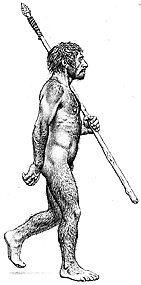Surprise! Neandertals Ate Plants
July 2, 2014
Ancient Neandertal coprolites (fossilized feces) discovered in a Spanish cave have confirmed that the diet of these prehistoric people was more varied than many scientists believed. Archaeologists discovered the coprolites at El Salt, a cave site near Alicante, on the eastern coast of Spain. About 50,000 years ago, the cave was occupied by Neandertals, prehistoric human beings who lived during the Ice Age in Europe and Central Asia from about 150,000 to 35,000 years ago. Neandertals (also spelled Neanderthals), were skilled hunters who scientists believed ate few, if any, plant foods. Some scientists had, in fact, suggested that Neandertals may have died out because of their carnivorous diet, while newly arrived modern humans thrived by adopting a more varied diet with a healthy balanced of animal protein and plant foods. However, the fossilized feces found at El Salt challenge this view.

Neandertals lived in Europe and Central Asia from about 150,000 to 35,000 years ago (© Jay H. Matternes).
Coprolites are highly prized by scientists studying prehistoric animals because they provide direct evidence of the foods the animals ate. Coprolites have been found from a variety of animals, including dinosaurs. Human coprolites have also been found at many archaeological sites. The coprolites at El Salt are believed to be the oldest known examples of human coprolites.
Although the material had broken down over time, chemical traces, called biomarkers, in the coprolites provided evidence that the El Salt Neandertals ate a diet rich in meat, most likely from wild deer, goats, and horses. The scientists detected one chemical, called coprostanol, which is formed in the digestive tract when bacteria break down cholesterol from meat. The ratio of coprostanol in the El Salt coprolites showed they were produced by Neandertals who lived at the site and not from such other meat-eating animals as bears or wolves that may have visited the cave site in the past. The scientists also detected another chemical biomarker, called 5 beta-stigmastanol, which is produced by bacteria acting on plant material in the digestive tract. The amount of this biomarker suggests plant foods made up at least 25 percent of the Neandertals’s diet. This discovery, along with previously discovered evidence of plant matter in fossilized plaque build-up on Neandertal teeth, shows that Neandertals were not pure carnivores as many scientists had believed.
Modern medical experts recommend eating your vegetables every day as a simple and easy way to help maintain good health. In fact, it’s so easy, even cave men could do it!
Additional World Book articles:


